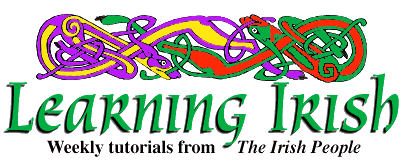
Irish Lesson 34
|
PRONUNCIATION REVIEW The group "ch" in Irish may still be difficult for you to pronounce. If it is next to a broad vowel, "a, o, u", it receives the aspirated sound of broad "c". This sound is like that in the German word "ach". Pronounce it by lowering the raised back of the tongue somewhat while you pronounce a broad "c", which is like the (k) in "coat" or "lock". Try the English word "lock" and then aspirate the (k) sound. This is similar to the Irish word "lách" (law*k*). Then say: loch (lohk*), dúch (dook*), croch (krohk*), gach (gahk*), sách (saw*k*). If the broad "ch" starts a word, it is still pronounced (k*) and not (h) in most cases. Try: cóta (KOH-tuh), chóta (K*OH-tuh), cháil (k*aw*l), chaill (k*eyel), chuaigh (K*OO-ig). We use the symbok (k*) for the pronunciation of this sound. If the "ch" is nest to "e, i", again lower the tongue somewhat while you pronounce the slender "c", which is like the (k) sound in the English "kill". The result will be a sound like "y" in English "you", but with a slight (h) sound before it. Try: chill (hyil), cheannaigh (HYAN-ee), chéim (hyay*m). Inside or at the end of a word, the sound can be much like an (h), as in: fiche (FI-he), crích (kree). The last word is pronounced differently from "crí" (kree) at its end, but our simplified pronunciation guide does not take this into account. Instead, you must watch for this "--ch" ending yourself. You may have seen anglicized place names and family names with a "gh" group in them, such as "Lough Erne" or "O'Loughlin". This "gh" was mistakenly adopted in the 19th century as the equivalent of the broad "ch" in Irish. The non-Irish speaker tends to pronounce "lough" as (loh) or (lawk), although it should be pronounced (lohk*), as if it were spelled properly: "loch", lake. "Lochlainn" means Scandinavia (or Denmark), and a "Lochlannach" is a Scandinavian. VOCABULARY Masculine Nouns hata (HAHT-uh), hat bríste (BREESH-te), trousers ceann (kyoun), head madra (MAH-druh) dog doras (DUH-ruhs) door halla (HAHL-uh), hall
Feminine Nouns cuid, an chuid (kwid, un k*wid), part fearthainn, an fhearthainn (FAR-in, un AR-in), rain seachtain, an tseachtain (SHAHK*T-in, un TYAHK*T-in), week Verbs bris, ag briseadh (brish, uh BRISH-uh), break cas, ag casadh (kahs, uh KAHS-uh), turn fill, ag filleadh (fil, uh FIL-uh), return stop, ag stopadh (stohp, uh STOHP-uh), stop tosaigh, ag tosú (TUH-see, uh TUH-soo), begin thosaíomar (huh-SEE-uh-muhr), we began DRILL 1. Review the form "Céard é seo? (kay*rd ay* shuh) Is leabhar é." "An leabhar mór é? Ní hea, ach leabhar beag." Go through this with the following groups: bord, bord gorm (GUH-ruhm), bord dearg (DYAR-ruhg) hata, hata bán, hata dubh halla, halla geal, halla dorcha doras, doras dúnta, doras oscailte bríste, bríste nua, seanbhríste madra, madra mór, madra beag 2. We will now work with the Lesson-20 vocabulary for a drill. Verbal adjectives for bain, ith, cnag, and ól are: bainte, ite, cnagtha, ólta "Tá sé ag ithe an aráin" is "He is eating the bread". Change this to "He ate the bread" and to "He has eaten the bread". Before you look at the Key below, do the same with: sí, ag ithe an bricfeasta mé, ag ithe mo lóin sinn, ag ithe feola siad, ag ól bainne tú, ag ól tae mé, ag ól uisce sé, ag ól chaife siad, ag ól beorach Seán, ag ithe aráin Key: D'ith sé an t-arán, tá an t-arán ite aige. D'ith sí an bricfeasta; tá ... aici. D'ith mé mo lón; tá ... agam. D'itheamar feoil; tá ... againn. D'ól siad bainne; tá bainne olta acu. D'ól tú tae; tá ... agat. D'ól mé uisce; tá ... agam. D'ól sé a chaife; tá .. aige. D'ól siad beoir; tá ... acu. D'ith Seán an t-arán; tá ...aige.
CONVERSATION Máirín (maw*-REEN): Cá ndeachaigh tú inné? Chonaic mé tú ag dul síos an bóthar go luath. Where did you go yesterday? I saw you going down the road early. Pól (pohl): Chuala mé go raibh éadach saor ag na siopaí sa chathair. Isteach liom ar an traein, ach ní fhaca mé rud ar bith arbh fhiú dom a cheannach. Ní raibh mórán daoine ann, ach oiread. I heard that clothes were cheap at the stores in the city. In I went on the train, but I didn't see anything worth buying. There weren't many people there either. Máirín: Nár chuala mé go bhfuil na praghsanna (PREYE-suh-nuh) ag dul síos anois? Didn't I hear that the prices are going down now? Pól: Níor chuala mé é, agus ní fhaca mé é, ach oiread. Cheannaigh mé léine agus bríste, agus ansin tháinig mé abhaile faoi dheireadh (YER-uh). I didn't hear it, and I didn't see it either. I bought a shirt and trousers, and then I came home finally. Máirín: Nach mór an trua é, anois? Isn't it a pity, now?
(c) 1997 The Irish People. May be reprinted with credit. |